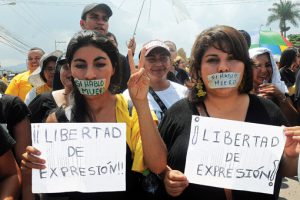Chile Refuses Mediation in Bolivia Sea Access Dispute
Chilean Foreign Minister Heraldo Muñoz said yesterday in a press conference that the country rejected any possible mediation from the Pope in a dispute with Bolivia over sovereign access through Chile to the Pacific Ocean that dates back to the nineteenth century. Muñoz’s comments came after Bolivian President Evo Morales’ statement on Sunday that Pope … Read more

AQ Video: Entrevista con Sergio Dahbar
Americas Quarterly habló con el periodista venezolano-argentino Sergio Dahbar durante su visita a Nueva York sobre el estado de la libertad de expresión en Venezuela. Nacido en Argentina, Dahbar trabajó en el diario venezolano El Nacional durante 20 años, donde sigue siendo columnista. Es además fundador de la revista El Librero y de los sellos editoriales … Read more
Monday Memo: Panama Canal – Venezuela Diplomacy – 114th U.S. Congress – Guatemala Trial – Uruguay Elections
This week’s likely top stories: the Panama Canal gears up to expand its Pacific coast facilities; Venezuelan President Nicolás Maduro travels to China and OPEC countries; the 114th U.S. Congress starts its session on Tuesday with a Republican majority and plenty of hot button issues for the Americas; the trial of Guatemalan General Efraín Ríos … Read more
Un barril de problemas para Venezuela
Ernesto Villegas, director de propaganda del Partido Socialista Unido de Venezuela (PSUV), aseguró hace dos semanas que si el petróleo venezolano llegase a cotizarse a 7 dólares por barril, la “revolución bolivariana no caería, se fortalecería”. La afirmación parece aventurada, incluso para los dirigentes del chavismo, acostumbrados a permear la realidad nacional con desconexos jingles … Read more
Colombia: las esperanzas del 2015
Los entusiastas de los diálogos recibimos con optimismo—y siempre cautela—las noticias de la última semana: la Unión Europea reconoció a Palestina como Estado, Cuba y EEUU restablecieron sus relaciones diplomáticas después de 55 años de “guerra fría,” y las Fuerzas Revolucionarias de Colombia (FARC) declararon un cese al fuego unilateral e indefinido. Decisiones audaces y … Read more
Obama Signs Venezuela Sanctions
President Obama signed a bill yesterday authorizing sanctions against Venezuelan officials accused of violating the rights of protesters in the South American country earlier this year. Venezuelan President Nicolás Maduro blasted the measure, tweeting, “I reject the insolent measures taken against Venezuela by the Imperial Elite of the Unites States; Bolivar’s Fatherland is to be … Read more
FARC Declares Unilateral Ceasefire
In a statement published on one of its official websites Wednesday, the Fuerzas Armadas Revolucionarias de Colombia (Revolutionary Armed Forces of Colombia—FARC) declared an indefinite, unilateral cease fire and end to hostilities in Colombia, on the condition that the rebels are not attacked by government forces. The announcement was made as part of the peace … Read more
Monday Memo: Colombia FARC Amnesty— Haiti Prime Minister — Argentina Railway — Venezuela PetroCaribe — U.S. Police Brutality
This week’s likely top stories: Colombians march against possible amnesty for FARC; Haitian Prime Minister Laurent Lamonthe steps down; Chinese railroad company wins $275 million in orders from Argentina; Venezuela seeks to expand PetroCaribe despite its fragile economic situation; Thousands gather across the U.S. in anti-police brutality protests. Uribe Leads Protest Against Possible FARC Amnesty: … Read more
Ecuadorian Lawyers take Chevron to Canadian Courts
A group of lawyers representing Ecuadorian villagers asked Canada’s Supreme Court on Thursday to try their decades-long case against Chevron in Canadian courts. The lawyers, led by primary attorney Steven Donzinger, are seeking compensation of about $9.5 billion dollars, granted by a judge in Ecuador for environmental damages in the Ecuadorian Amazon. Whether or not … Read more
U.S. Senate Sanctions Venezuela on Human Rights
The U.S. Senate approved a bill on Monday that would impose sanctions on Venezuelan officials found responsible for violating demonstrators’ rights during anti-government protests that left more than 40 dead and 800 injured since February. The Venezuela Defense of Human Rights and Civil Society Act authorizes sanctions that would freeze assets and ban visas of … Read more
Ibero-American Summit Begins in Veracruz with Notable Absences
The leaders of Latin American and Iberian countries were on hand for the opening of the 24th Cumbre Iberoamericana (Ibero-American Summit) in Veracruz, Mexico yesterday. Just as notable as who was present, however, was the long list of absences. A block of six presidents—representing Brazil, Argentina, Venezuela, Bolivia, Nicaragua and Cuba—snubbed the two-day summit, which … Read more
Peru Shares Proposal for Reducing Emissions
Peruvian Minister of the Environment Manuel Pulgar-Vidal, who is presiding over this year’s United Nations summit on climate change in Lima, said on Tuesday that building a national carbon inventory will be his country’s first step for reducing emissions and formulating an “intended nationally determined contribution” (INDC), which countries will submit March 2015. INDCs, developed at … Read more
Venezuelan Opposition Leader Charged with Conspiracy
The Venezuelan state prosecutor’s office formally charged former Congresswoman Maria Corina Machado with treason and conspiracy for allegedly plotting to kill President Nicolas Maduro this Wednesday. The indictment comes after a chain of emails plotting to start a coup to overthrow the Maduro administration surfaced in May, allegedly between U.S. officials and Machado, an opposition … Read more
UN Climate Change Delegates Under Pressure to Reach Consensus
On assuming the presidency of the 20th Conference of Parties (COP20) annual climate change conference in Lima on Monday, Peruvian Minister of the Environment Manuel Pulgar-Vidal reminded delegates from 194 countries that they should seize the opportunity to reach a global consensus to reduce emissions ahead of next year’s Paris agreement. “Never has it been … Read more
Government Announces Agreement to Combat Illegal Mining in Cauca
The Colombian government announced on Monday initial agreements to combat illegal mining in Cauca province, four days after Afro-Colombian women from the region took over the Interior Ministry to protest illegal mining operations in their communities. In recent years, there has been an increase in illegal gold mining in Cauca, which is controlled by gangs … Read more


